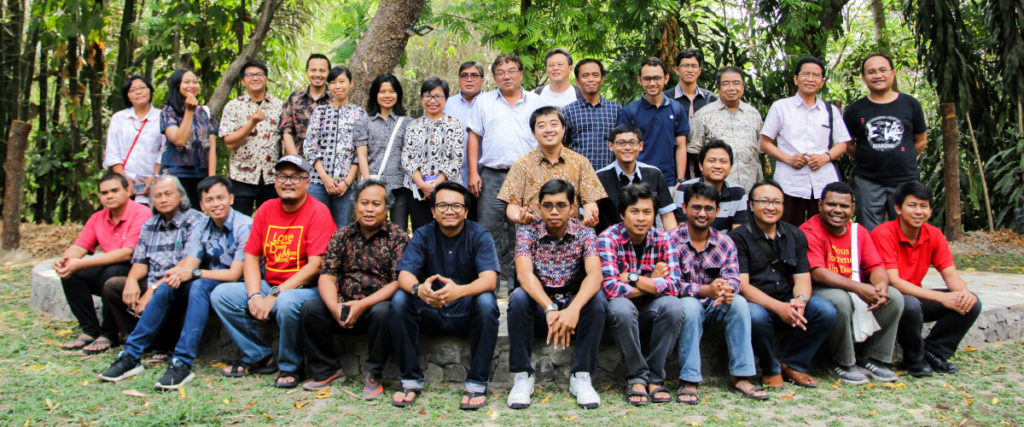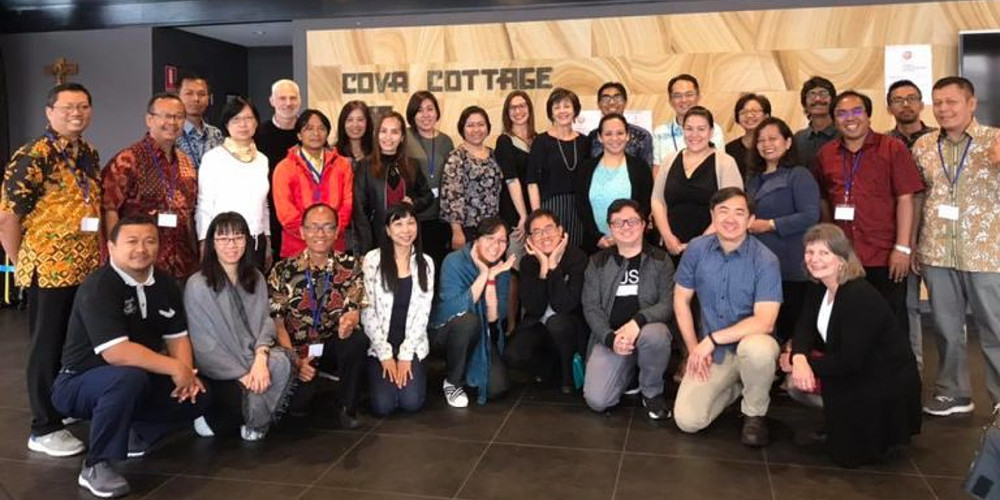At the International Congress for Jesuit Education, Fr General Arturo Sosa said, “The Internet and social networks have changed how humans think, react, communicate and interact. It is not just a matter of new technology; it is a new world in which people live, especially the younger generations.” This statement became the foundation of the one-day workshop on the ministry of media and communications held at Studio Audio Visual Puskat, Yogyakarta on October 9.
Fr FX Murti Hadi Wijayanto SJ, workshop coordinator, chose “Rediscovering Media and Communications Ministry in the Digital Era” as the workshop theme. The participants included Jesuits and collaborators who work in the media and communications ministries of the Indonesian Province, particularly Kanisius Printing and Publishing, Basis Magazine (magazine on culture and literature), SAV Puskat Sinduharjo (audio video production centre), and Jesuit Insight (social media of Indonesian Jesuit scholastics).
The workshop was enriched by the participation of other lay collaborators, among them: Yulianus Ladung (photographer and social media influencer), Domunicuc Bernardus (founder of E-Katolik Android app), Gregorius Magnus Finneso (chief officer of Kompas Newspaper) and Arum (communications expert and professor at University of Atma Jaya Yogyakarta).
Fr Wijayanto said, “[The] Indonesian Province’s media and communications ministries work in a conventional way. Most of them are directed by older Jesuits. With Industry 4.0, we need to upskill in our use of digital platforms to reach the youth in our ministries. There is a technological generation gap, and the result is that media and communication ministries of the Indonesian Province have developed slowly.”
In his presentation, Fr Y Iswarahadi Ispuroyanto SJ, Studio Audio Visual Puskat Director, said, “Filmmaking has been decreasing. People can learn to make a film by watching YouTube. Moreover, our films shown on national TV now have fewer audiences.”
In the digital era, there should be convergence between conventional and modern ways. Finneso, who was the guest speaker at the workshop, said “Convergence in the digital era is a must. This is the answer in the shift to Industry 4.0. We should be on digital platforms to reach more customers. However, we continue to produce our brands in conventional ways. There should be a complement between [the traditional and modern].”
In light of Fr General’s comments at JESEDU-Rio in 2017 and the insight of the guest speakers, Fr Benedictus Hari Juliawan SJ guided all the participants in looking deeper into their respective ministries. He proposed a way of proceeding that can use our Jesuit worldview to animate our ministries and can be integrated in every Jesuit apostolic mission. In so doing, every Jesuit has the opportunity to influence and invite people to think, reflect and act in a manner worthy of Ingatian spiritualty.
From the participants’ evaluation of the Province’s media and communications ministries, Fr Juliawan suggested, foremost, that since no digital platforms of our media ministries are integrated, convergence might be one way of addressing the issue. Second, interactivity should be encouraged, so we can create a community among customers within and through platforms. Third, in the digital era, we cannot use digital platforms as secondary. If we want to work with the youth through digital platforms seriously, we have to invest not only in big budget items, but also have people who are passionate about digital media. Finally, our presence on social media is not to become followers of trending topics. Rather, we must be an influence on social media through our Ignatian worldview.





